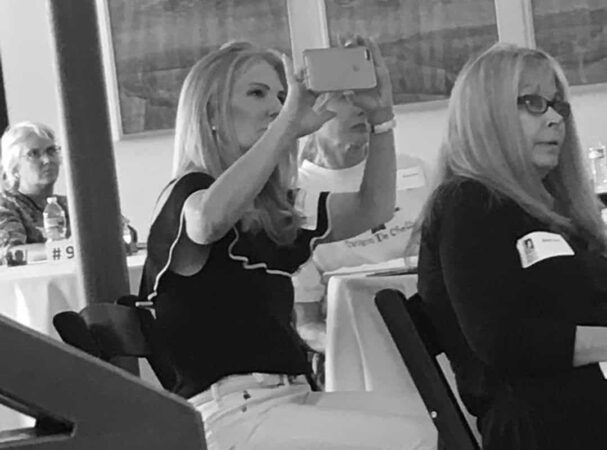No one understands the business challenges that artists face better than other artists. That’s why CHF asks established working artists to weigh in on their peers’ most common questions. Their anecdotes and insights shed light on how artists’ business concerns and strategies play out in the real world.
Q: What if a gallery refuses to work with you if you require a contract?
P.A. Nisbet: A gallery is a business organization with whom you agree to sell your work. Any business transaction in this modern day and age must be made in writing if you are to have any legal recourse in the event a gallery defaults on its obligations. Contracts or consignment forms are standard in the business of art. They protect both the artist and the gallery. Your word alone will not be enforceable in a court of law. For every piece you loan to a gallery, get a consignment form with a full description of art titles/sizes, terms, time limits, and agreed-upon prices and commissions to be paid to both parties. A gallery that won’t do this is a business that may eventually cheat you. Be careful to protect your work. (PANisbet.com)

Jennie Ottinger: If it’s really important to you, you could write something up, and just explain that it would make you feel more secure. If they refuse to sign it, that is not good, and I wouldn’t work with them. The terms are pretty standard, so I can’t imagine a reputable gallery refusing. (jennieottinger.com)
Krystii Melaine: I don’t have contracts with some of my galleries, but I expect they would sign one if I asked them to, as long as the terms are what we have already agreed to. If a gallery refuses to sign a contract, find out why. A professional gallery should have standard business terms that they apply to all of the artists they work with, so putting them into a contract shouldn’t be a problem. However, they might not want to go to the expense of having a contract drawn up professionally, so you may have to provide a professional contract yourself. If they flatly refuse to be bound by any contract without good reason, I wouldn’t do business with them. There are plenty of other galleries out there! Contract or not, I always include two copies of a consignment agreement with every painting I send to a gallery, one of which they are required to sign and return to me. It lays out the basic terms of our agreement: date of consignment; details about the paintings, including title, size, medium, retail price, and my wholesale price; gallery commission percentage; how long after a sale they will pay me; who is responsible for any damage or loss; and who will pay for return or forward shipping. It reminds them of our agreement every time, and it also ensures that they have all the information they need about the paintings.(KrystiiMelaine.com)

Jane Robinson: I would never agree to work with a gallery or any business if they do not agree to a contract. By outlining what expectations we BOTH have regarding our partnership, we avoid any misunderstandings. If they are not willing to put in writing their obligations and my responsibilities, they are confirming that they are not professional, and they are the wrong venue for me. (JaneRobinsonAbstractArt.com)
Bart Walter: Gallery owners are just as unique as the painters and sculptors they represent. Some do business on a handshake, others require a contract. I have worked successfully with galleries both ways. The important thing to remember is that trust is paramount for any successful gallery relationship. If you do not trust a gallery owner, do not do business with that gallery. Period. (BartWalter.com)

Robert C. Jackson: We tend to elevate galleries, but when it comes down to it, most are simply small retail stores. So, things often happen over a beer and a handshake, and I’ve worked that way many times. Of course, you’d like to agree on things like who handles shipping, how long does it take to get paid, how discounts should be handled, and even how long they get to keep the work if unsold. Seems to me a contract is really only enforced once you leave. Are you going to sue them for not keeping to the contract when you are still represented by them? I doubt it. So contracts kind of protect you on the back end. A pretty tough one to answer without seeing the contract, especially not knowing if anything weird is included; if it’s pretty boilerplate, I would wonder why the gallery is balking. (RobertCJackson.com)
Rebecca Mundy: This should tell you that they don’t want to deal with legalities, and be responsible for commitments to what they tell you. The previous generation was good on a handshake, but that’s not true today. If they say they don’t do contracts, I would ask them what their expectations are from a gallery-artist relationship (e.g., you pay to send the work there, and they pay to send it back if it doesn’t sell; payment expectations, etc.) Make up a list of what you expect. Get the answers written in an email from them. (CWMundy.com)






